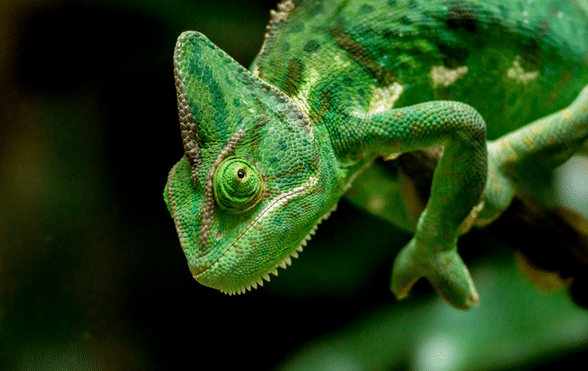From the weird to the wonderful, reptiles are amazing creatures, and have evolved a variety of ways to fool predators, communicate and compete for survival.
Is your reptile insured? Get a quote for £1,000 of vet fee cover, death and theft cover for lizards and snakes. Or £2,500 of vet fee cover, death and theft cover, if you own a tortoise. Vet fee cover only also available | We’ve been insuring exotic pets since 1996 | Check out our customer reviews on Feefo.
Our list of 10 little known facts showcases the intelligence of our reptile community.
-
- Gecko’s can detach their tail
Under times of extreme stress, a gecko can detach its tail. It’ll do this to confuse and escape from predators.
The gecko will initially wag its tail in front of the predator, who then tries to grab it.
The tail then detaches leaving the predator to puzzle over what’s happened. The gecko then makes a quick getaway! How about that for a magic trick!
Known as autotomy, the gecko isn’t hurt in the process. Cleverly the tail is designed to have a point of detachment surrounded with connective tissue, there’s also very little blood loss.
Geckos may also detach their tail if they feel bullied by other gecko’s; if their owner holds their tail, or if they’re sick.
Gecko’s can also grow their tail back! The brand-new tail isn’t quite the same as the old one – and can be a bit crooked. However it’s there, and all in one piece!
-
- Bearded Dragons cannot sweat
Instead of sweating a Bearded Dragon will cool down by opening his mouth. It’s why you’ll often see basking beardies sitting there with their mouths open.
The same behaviour can also be seen in crocodiles whose open jaws aren’t just there to scare people, but also to just try and cool down.
-
- There are 9 species of Bearded Dragons and they all originate from Australia
The most popular worldwide species is the Central Bearded Dragon (Pogona Vitticeps). In the UK this is followed by the smaller Rankins (Henrylawsoni) Dragon.
All Beardie’s ancestors originate from Australia, from where they were exported up until the 1960’s when it became illegal. There are lots of Beardie’s around the world now, and they are one of the most popular reptile pets here in the UK.
-
- Why do chameleons change their colours?
Most people think that chameleons change colour to hide themselves more easily. However, this is wrong.
In fact Chameleons change colour to communicate their mood. If they’re feeling calm, they‘ll be a pale colour, if they’re feeling defensive they’ll be a darker colour, and bright colours can be used to attract mates!
Colour changes are also associated with temperature and light. They’ll change to a darker colour to retain heat and warmth, and to a lighter colour to repel heat, and stay cool.
-
- Tortoises beat man to the moon!
A little-known fact but tortoises were the first animal to circle the moon – beating humans by a few months.
In September 1968 an un manned (but tortoise manned) space craft was launched by the Soviets called Zond 5. It carried two tortoises, insects and plants, and was the second ship to orbit around the moon, and the first to return home safely.
By December 1968 the first astronauts undertook the same journey. Go tortoises!
 Gecko’s store fat and water in their tails
Gecko’s store fat and water in their tails
-
- Geckos’ tails are a food larder
Gecko’s store fat in their tail, so that in times of food scarcity the fat reserves can support the gecko.
A gecko’s tail can be compared to a camel’s hump. It means that it can go for many days without food or water and still be okay. However, it’s not advised to test this out.
-
- Snakes and lizards use their tongues to smell
Unlike humans, snakes and lizards don’t smell through their nose. Instead, they use their tongues.
They whip out their tongue and pick up scent particles in the atmosphere which are then transferred to the Jacobson organ in the reptile’s mouth.
This patch of sensory cells transfers the information to the brain, which is then interpreted. The reptile will then know more about the item and how to react.
The process can also be used to pick up pheromones from the opposite sex, and is essential for reptiles looking for a mate.
-
- A Bearded Dragon can turn black!
It’s not just chameleons who can change colour. A beardie’s back’s will darken at night time to retain heat and warmth. It’s a bit like when we wear dark clothes in the winter to keep warm.
During the day a bearded dragon’s skin will become very light, as their skin reflects heat and warmth. This helps to keep them cool. Again, like when we wear light clothes during the summer.
-
- Lying on top of each other
This isn’t as cute as it looks! It’s actually a sign of dominance. Beardie’s are reliant on UV light – and they lie on top of each other to get more UV light exposure than their fellow beardies.
Thus making them more healthy. So next time you see two beardie’s cuddle, things may not be all they seem!
-
- Parietal Eye
Bearded dragons have a small dot nicknamed a ‘third eye’ on the back of their head.
This allows them to detect changes in light thus regulating their body temperature. The ‘third eye’ has a basic lens and retina. It can also detect approaching predators, through the changes in light.
So when you next try to creep up on your Beardie and he runs away, you’ll remember that he really does have eyes in the back of his head!
Is your reptile insured? Get a quote for £1,000 of vet fee cover, death and theft cover for lizards and snakes. Or £2,500 of vet fee cover, death and theft cover, if you own a tortoise. Vet fee cover only also available | We’ve been insuring exotic pets since 1996 | Check out our customer reviews on Feefo.

